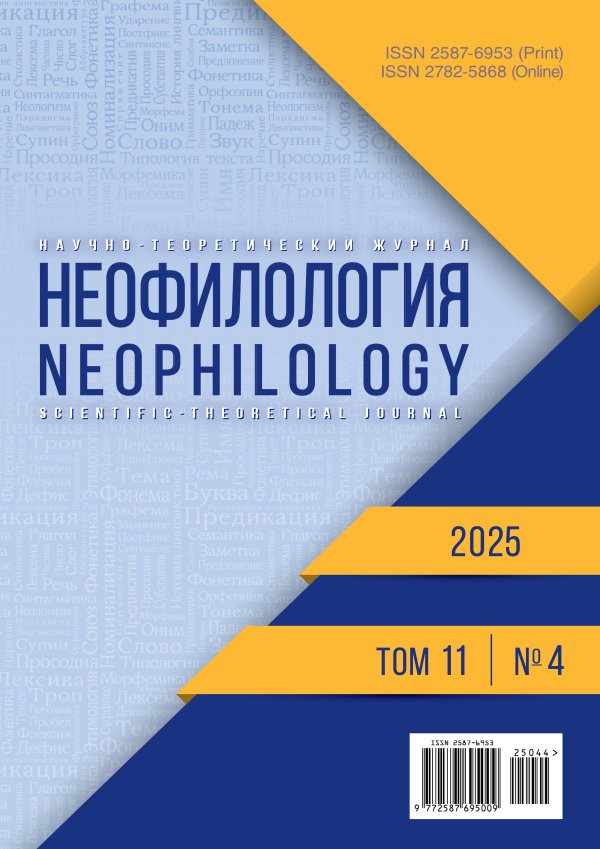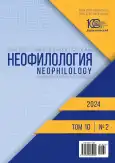О роли топонимических коммеморативных практик в исследовании и сохранении исчезнувших наименований географических объектов
- Авторы: Попов С.А.1
-
Учреждения:
- ФГБОУ ВО «Воронежский государственный университет»
- Выпуск: Том 10, № 2 (2024)
- Страницы: 334-344
- Раздел: ОНОМАСТИКА
- URL: https://journal-vniispk.ru/2587-6953/article/view/295596
- DOI: https://doi.org/10.20310/2587-6953-2024-10-2-334-344
- ID: 295596
Цитировать
Полный текст
Аннотация
ВВЕДЕНИЕ. Рассмотрена проблема исследования и сохранения исчезнувших наименований географических объектов посредством топонимических коммеморативных практик. Дан анализ деятельности средств массовых коммуникаций, благодаря которым память об ушедших топонимах передаётся будущим поколениям жителей страны в целом и отдельных регионов, а местный топонимический мартиролог регулярно пополняется новыми названиями. Цель исследования – выявление роли топонимических коммеморативных практик в исследовании и сохранении исчезнувших наименований географических объектов, располагавшихся на территории Российской Федерации.МАТЕРИАЛЫ И МЕТОДЫ. На конкретных примерах из опыта Воронежской области по успешной реализации топонимических коммеморативных практик рассмотрены их основные виды, даны рекомендации органам государственной власти и местного самоуправления по работе в этом направлении. Эмпирическая база исследования состоит из алфавитных списков географических названий ранее существовавших населённых пунктов, зарегистрированных в автоматизированном государственном каталоге географических названий, публикаций в СМИ и в научных изданиях.РЕЗУЛЬТАТЫ ИССЛЕДОВАНИЯ. Показано, что основными видами топонимических коммеморативных практик могут стать установка на месте исчезнувших населённых пунктов памятных знаков, информационных табличек, часовен, памятников, публикация соответствующих краеведческих материалов, художественных произведений и мемуаров бывших жителей данных населённых пунктов в региональных и районных СМИ, проведение массовых культурно-исторических мероприятий.ЗАКЛЮЧЕНИЕ. Коммеморативные практики являются надёжным каналом сохранения памяти об исчезнувших населённых пунктах и их названиях и передачи соответствующей историко-топонимической информации последующим поколениям россиян. С этой целью органам государственной власти и местного самоуправления субъектов Российской Федерации рекомендуется в своей деятельности применять топонимические коммеморативные практики.
Об авторах
С. А. Попов
ФГБОУ ВО «Воронежский государственный университет»
Автор, ответственный за переписку.
Email: spo@bk.ru
ORCID iD: 0000-0002-9515-5296
кандидат филологических наук, доцент кафедры связей с общественностью, рекламы и дизайна факультета журналистики
394018, Российская Федерация, г. Воронеж, Университетская пл., 1Список литературы
- Маслова В.А. Лингвокультурология. М.: Изд. центр «Академия», 2001. 208 с. https://elibrary.ru/ukcoej
- Попов С.А. Топонимический мартиролог региона как часть национального культурного пространства Российской Федерации // Социолингвистика. 2022. № 3 (11). C. 104-119. https://doi.org/10.37892/27132951-3-11-104-119, https://elibrary.ru/nrotsa
- Гордова Ю.Ю. Топонимический атлас России: состояние и перспективы // Ономастика Поволжья: материалы 21 Междунар. науч. конф. Рязань: РГУ им. С.А. Есенина, 2023. С. 117-120. https://elibrary.ru/xnvspd
- Попов С.А. Проблемы словаря ушедших географических названий Воронежской области // Вестник Воронежского государственного университета. Серия: Филология. Журналистика. 2019. № 4. С. 45-47. https://elibrary.ru/evbxdj
- Супрун В.И. Сколько экстралингвистики может быть в топонимическом словаре?: Взгляд географа, историка и лингвиста // Пересекая границы: межкультурная коммуникация в глобальном контексте: сб. материалов 1 Междунар. науч.-практ. конф. М.: Гос. ин-т рус. яз. им. А.С. Пушкина, 2018. С. 266-268. https://elibrary.ru/uokchl
- Попов С.А. Материалы к «Словарю исчезнувших названий населённых пунктов Воронежской области» // Актуальные вопросы современной филологии и журналистики. 2021. № 4 (43). С. 49-55. https://doi.org/10.36622/AQMPJ.2021.81.52.007, https://elibrary.ru/gvffjv
- Ковалёв Г.Ф. Библиография в помощь краеведу-ономасту // Воронежское лингвокраеведение. 2021. Вып. 5. С. 272-289. https://elibrary.ru/qkmilm
- Пархоц Э.О. Микротопонимы как носители диалектной информации (на материале микротопонимии Верхнехавского района Воронежской области) // Вестник Воронежского государственного университета. Серия: Филология. Журналистика. 2017. № 3. С. 63-65. https://elibrary.ru/ziolsn
- Пархоц Э.О. Названия исчезнувших населённых пунктов в микротопонимии Верхнехавского района Воронежской области // Ономастика Поволжья: материалы 21 Междунар. науч. конф. Рязань: РГУ им. С.А. Есенина, 2023. С. 130-134. https://elibrary.ru/ghtfjh
- Краснова Т.В. Топонимия как часть культурного кода нации // Духовность и ментальность: экология языка и культуры на рубеже XX–XXI веков: сб. ст. по материалам Междунар. науч.-практ. конф., посвящ. пед. и науч. деятельности проф. Г.В. Звёздовой и приуроч. к её юбилею. Липецк: ЛГПУ им. П.П. Семёнова-Тян-Шанского, 2017. Ч. 1. С. 86-90. https://elibrary.ru/zdhoup
- Исрапилова З.А. Роль коммеморативных практик в процессе функционирования и развития исторической памяти // Исторические, философские, политические и юридические науки, культурология и искусствоведение. Вопросы теории и практики. 2016. № 2 (64). С. 70-73. https://elibrary.ru/vjfojl
- Дьякова В.И., Хитрова В.И. Словарь географической лексики Воронежского края (с историческими комментариями). Воронеж: ВГУ, 2009. 343 с. https://elibrary.ru/wablcn
- Ковалёв Г.Ф. Словарь микротопонимов Воронежской области: в 2 т. Воронеж: НАУКА-ЮНИПРЕСС, 2017. Т. 1. 410 с. https://elibrary.ru/narrbt
- Попов С.А. Региональная топонимия как материал для работы журналистов районных средств массовой информации // Неофилология. 2023. Т. 9. № 2. С. 266-273. https://doi.org/10.20310/2587-69532023-9-2-266-273, https://elibrary.ru/zjwrtu
- Голомидова М.В. Топонимическая политика // Социолингвистика. 2022. № 3 (11). С. 172-177. https://doi.org/10.37892/2713-2951-3-11-172-177, https://elibrary.ru/ojwuan
Дополнительные файлы











